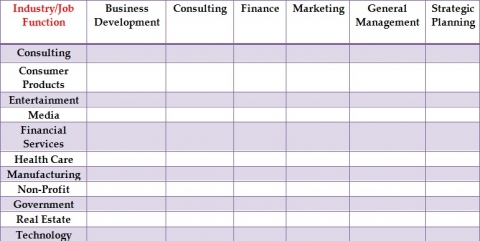When we recommend applicants to follow the fundamentals of storytelling, most of them look at us with suspicion. The admission team has to go through at least twenty essays before they can find a genuine narrative that looks honest and interesting. Story format in itself will not guarantee you admission. You have to meet the entry criteria (GMAT, GPA, and Experience) for the program while differentiating from other similar profiles, but storytelling by itself can act as a differentiator if your profile is weak or your achievements have a low recall within your profession.
Before you study extensively about Storytelling for MBA Application Essays, understand that every story answers the four fundamental questions:
1. Who is the protagonist?
2. Where is he going?
3. How will he achieve the goals?
4. How will he be transformed after achieving the goals?
The difference between movies/novels and storytelling for essays is that in essays one more question has to be answered explicitly.
1. Who is the protagonist?
2. Where is he going?
3. Why is he going?
4. How will he achieve the goals?
5. How will he be transformed after achieving the goals?
In movies, the storyteller has a 90-minute window while in novels a 60,000 word count to slowly unravel the why part with the SHOW don’t tell approach. In essays, you are dealing with word count in the 250-500 range, a space that constricts you from indulging in dialogues or describing the scenery of the event.
1. Who is the protagonist?
The resume is the introduction that informs the admission team about you. Make sure that you cover the most impactful events and achievements in the 1-page format. Use our services to edit the resume. If you spend, any words on revealing who you are through the essays, you would already take up at least 100-150 words from a 500-word essay. You can’t afford to do so.
Exposition without killing the narrative
In superhero movies, there will be a character, who assembles the heroes (Avenger) or a mentor who recognizes the power of the protagonist (The Matrix), reveals the superpowers of each hero, defines the goals and set the stage for action. In thrillers, the detective either will reveal in one monologue about what happened (50s and 60s movie) or split it out in a sequence of monologues interfered by action sequences that keep interrupting his findings or posing harm to the detective to avoid the revelation. In bad movies, one character will explicitly reveal the motivation in a dialogue.
So what format should you follow?
The character that mentors the superhero is the Recommender. The equivalent of bad movies is a recommendation letter where the supervisor lists out all the qualities without using the SHOW Don’t Tell Approach. Let the recommender reveal your superpower through your previous actions, backstory, and your potential while setting you up for the sequel – the post-MBA career path.
2. Where is he going?
The “Why MBA” question tries to find out the answer to this question. Your journey towards a bigger goal – something that you cannot achieve with your current skillset, should not deter you from trying. Superhero movies perfectly capture the essence of this narrative. Peter Parker is the dork that seems not to get anywhere in life without the power of his web-shooters, but his heart is in the right place. He sees injustice, understand his limitations, but aspires to achieve something that is bigger than what he is. If you can explain where you are going with a balanced narrative on your skills, demonstrated through your achievements, and what you don’t have, ‘the superpower’ that the MBA program (specific new skills, network, and confidence to take on your goals) will offer, the Essay reviewer will root for you.
Predictability of the Path
In movies and stories, the characters can create an illusion that the path they traverse is unique, but if you cut out all the bells and whistles, the motivation for the path will come down to justice, love, and immortality. In a post-MBA world, there are only limited career paths: Consulting, Finance, Technology and Non-Profit, but when you combine the industry and job function, the path multiplies. 
The admission team has a comprehensive awareness about the possible career paths. If you divert from the path too wide, it will not register within the storytelling narrative. Humans have evolved with a superior BS detector. The intuition has helped us outlive Neanderthal, Homo erectus, and Homo Habilis. The Admission team has one additional responsibility other than selecting promising and qualified students - to guard the brand of the Business School. They have developed a keen ear for exaggeration and spins.
Unfortunately, we have seen too many applicants creating a brilliant narrative but mentioning career paths that seem impossible or does not require an MBA. Use a third-party service to review your essay and evaluate the feasibility of your plan.
3. Why is he going?
“What you have done is an indication of where you are going.”
You might not believe in this statement, but a vast majority of the admission team does. You can’t say that you would like a post-MBA role where extroversion is valued when you have not demonstrated the quality in your professional life or extra-curricular. It is unfair that you are stuck in a persona defined in your teen, but if you hate a job function, you will most likely find the actual calling, initially as a hobby, and then slowly as a full-time gig when the market rewards you for the effort.
Career switchers
Everybody has a reason for switching careers. A few common ones we have seen are:
Engineering -> Creative (Entrepreneurs/Writers/Media Personality) (An inexplicable thirst to create, find an audience and leave a legacy)
Engineering -> Finance (MBAs) (Engineering professionals who find Finance as a natural extension of their skills in reasoning, numerical analysis, and logical deduction)
Finance -> Marketing (Professionals who are fascinated by the propagation of the message more than the product and those who found the repetitive task of quantitative analysis boring)
Marketing -> Finance (Rare few. Those who survive in marketing are extroverts. Unless an increase in post-MBA salary is the motivation, very few professionals make the switch)
Finance -> Consulting (Finance restricts the mastery to one particular aspect of the Business while consulting, despite the travel demands, is a satisfying career path for most professionals)
Consulting -> Finance (Professionals who mastered an industry, feel disillusioned with the process- centric role that a consultant experiences and looks at Finance as a much better alternative with superior pay options)
Finance/Engineering/Consulting -> Non-Profit/Government (Professional who have earned financial stability often feels disillusioned after reaching the goal and seeks to find meaning from their work. Non-profit and Government offer roles that would have a much direct impact on the society)
The reasons for switching are equally important as the demonstrated skills in the new job function or jobs that require similar skills. Your ability to learn, adapt and work with people from diverse background is an indicator on whether you will achieve what you have aspired. Learning is not limited to grades and performance in a National Aptitude Test or a Math Olympiad. Any experience where you came out of your comfort zone and learned the vocabularies of a new job function while working under uncertainty is a valid evidence of your potential.
Supervisors strategically affirming your ability through recommendation letters should reinforce the idea that you are an ideal candidate for career switching.
Motivation -> Skills -> New Career
Motivation is a pre-cursor to skills, and if you cannot articulate, why the new career is important, you would not stick with the aspiring job function for the next 5-10 years. For the MBA Admission team, recruiting a candidate, who is fickle with the career choice, is risky. The recruiters want some form of guarantee that the applicant will go on to play a major role in the company, and not switch ships at the first opportunity.
Hooking the candidate through debt is a strategy that has worked for Employers. If you have a $200k debt, would you go for a start-up with an unpredictable future or an established Consulting or Finance role where the 150k+ annual salary is guaranteed? We noticed that despite a large majority of candidates citing unique motivations, they often work 1-3 years in traditional roles, to pay off the debt, before venturing out on their real post-MBA goals. So articulating unique goals is not bad in itself. It is much better that quoting the most likely short-term post-MBA career path.
4. How will he achieve the goals?
The MBA program has a fixed assembly line of learning: core, electives, experiential learning, speaker series, and student clubs. Most applicants will touch ....
....
.....
Download Winning MBA Essay Guide for the Complete Chapter (Foundation of Effective Storytelling for Essays: Transformation Matrix)
Includes: How to create the Transformation Matrix with Examples for Professionals from Technology and Marketing
About the Author

I am Atul Jose - the Founding Consultant at F1GMAT.
Over the past 15 years, I have helped MBA applicants gain admissions to Harvard, Stanford, Wharton, MIT, Chicago Booth, Kellogg, Columbia, Haas, Yale, NYU Stern, Ross, Duke Fuqua, Darden, Tuck, IMD, London Business School, INSEAD, IE, IESE, HEC Paris, McCombs, Tepper, and schools in the top 30 global MBA ranking.
I offer end-to-end Admissions Consulting and editing services – Career Planning, Application Essay Editing & Review, Recommendation Letter Editing, Interview Prep, assistance in finding funds and Scholarship Essay & Cover letter editing. See my Full Bio.
I am also the Author of the Winning MBA Essay Guide, covering 16+ top MBA programs with 240+ Sample Essays that I have updated every year since 2013 (11+ years. Phew!!)
I am an Admissions consultant who writes and edits Essays every year. And it is not easy to write good essays.
Contact me for any questions about MBA or Master's application. I would be happy to answer them all